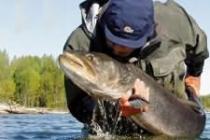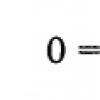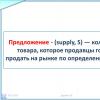Dialectisms are linguistic features characteristic of a particular area. These can be individual words, as well as phrases and expressions.
The term comes from the Greek word dialektos - “talk, dialect”.
There are phonetic, grammatical, word-formation and lexical dialectisms.
Lexical dialectisms
Lexical dialectisms are heterogeneous; several groups can be distinguished: ethnographisms, lexical dialectisms proper, semantic and word-formative dialectisms.
Ethnographisms They name objects and concepts that are characteristic of everyday life and the economy of a given area, but do not have synonyms in the literary language.
Poneva
For example: poneva- a type of skirt (an element of Russian folk costume, a women's woolen skirt for married women made from several pieces of fabric).

Tues- a small birch bark box with a lid. The classic tub has a cylindrical shape. Shalonik- the name of one of the winds among the Pomors. Zybka- cradle.
Actually lexical dialectisms have corresponding synonyms in the literary language: kochet(rooster), basque(Beautiful), hefty(Very), beetroot(beet).
Semantic dialectisms have their own meaning, different from the meaning of the literary language: in a word "bridge" in some areas it is called a canopy; word "thin" means "bad" (thin person = bad person).
Grammatical dialectisms
In some areas, verbs in the 3rd person are pronounced with a soft [t]: he go, They take etc.
In the endings of nouns the letter changes: no longer(instead of his wife); from my sister(instead of from my sister).
The control of prepositions changes: came from Moscow; go to the house.
Word-formation dialectisms
In some areas the berry is called blueberry "blueberry"», « Cherniga", i.e. invent a new word based on a literary one. The calf is also called by its own name: heifer, heifer, heifer.
Phonetic dialectisms
The peculiarity of such dialect words is their specific pronunciation. For example, clicking: do[ts]ka, but[ts]; yak: [core], [five]; pronunciation [x] in place of [g] at the end of the word: sleep[x], other[x].
The use of dialectisms in fiction
In fiction, dialectisms are used to characterize the speech of characters, to create local color, i.e. for a realistic depiction of reality. If we read how the Cossack speaks in pure Moscow dialect, we would not believe the author of the work, we would deny his truthfulness. Elements of dialect speech (dialectisms) are found in the works of classical and modern literature by many Russian writers: V. I. Belov, V. G. Rasputin, V. P. Astafiev, M. A. Sholokhov, P. P. Bazhov, B. V. Shergin and others. The diversity of Russian dialects is reflected in numerous works of Russian folklore. Folklore is also used in modern art: folklore recordings in Russian dialects form the basis of the work of the Ivan Kupala group.

Group "Ivan Kupala"
But sometimes dialect words can be found in the speech of people who have not fully mastered the norms of the literary language.
A dialect is a layer of language that often does not have a written language.
French linguists, along with the term “dialecte”, use the term “patois”, which also denotes the locally limited speech of certain groups of the population, mainly rural.
History of dialects
Modern Russian dialect groups were formed as a result of interactions, transformations and regroupings of dialects of the Old Russian language. The Russian northern dialect developed as a result of contacts between Novgorod and Rostov-Suzdal settlers who settled the Russian North from the 12th-13th centuries. Western and eastern Central Russian dialects developed within the more ancient parts of the territory of the Novgorod and Rostov-Suzdal lands. A decisive role in the development of the “transitional character” of these dialects was played by their interaction with the southern Russian dialect region, which separated the southern Novgorod and Rostov-Suzdal territories from the northern ones.
The Smolensk-Polotsk dialects gradually entered the sphere of influence of the southern Russian Akaya dialect, as a result of which the modern area of the southern dialect of the Russian language was formed, connected by a wide band of transitional dialects with dialects of the Belarusian language.
Introduction
Any person for whom Russian is a native language knows what the words money, eat, cranberry, meadow, tractor mean, but not everyone is familiar with words such as finagi (money), beryal (eat, eat), pozhanka (meadow ), cranebird (cranberry).
The words money, eat, cranberry, meadow, tractor belong to the public vocabulary (the term “national vocabulary” is to a certain extent arbitrary, since most people do not use non-literary words in their speech. On the other hand, many literary and book words are unknown to people with little culture). Its understanding and use do not depend either on the place or on the professional affiliation of a person. It is the national vocabulary that forms the basis of the national Russian language. The popular vocabulary includes literary words: trees, think, tiny, liar, etc., non-literary vocabulary, which is common among people of various professions and ages: fool, brainy, foolish, will do, etc.
Non-popular vocabulary is vocabulary, the understanding and use of which is related to a person’s profession, place of residence, occupation, etc. Non-popular vocabulary includes dialect, special and slang words.
1 Dialectal (regional) vocabulary
Dialectal (otherwise regional) vocabulary is that part of non-national vocabulary that is a characteristic feature of the speech of the population of which
- or locality, region, district. There are words used only by residents of the northern regions: roe deer (plow), lava (bridge), teplina (fire), etc.
There are words characteristic of southern cities: order (forest), kozyulya (earth), ploshcha (bushes), etc.
Dialectal words that are used in fiction are called dialectisms. The term “dialectism” includes not only what refers to the peculiarities of the vocabulary of a particular dialect or dialect, but also what constitutes its phonetic, word-formation or grammatical feature. For example: floppy
(cheerful), rokh (tog), damno (long ago), entot (this) - phonetic dialectisms; tying hay (fresh hay), u me (me), stepya (steppe), scold (scolds) - grammatical dialectisms; odnova (once), face to face
(layer), along (along) – word-formation dialectisms.
Among lexical dialectisms they distinguish: lexical dialectisms themselves - words that have synonyms in the literary language with a different root: basque (beautiful), vir
(whirlpool), cats (boots), chapura (heron) and other semantic dialectisms are words that in a given dialect (spoken) have a meaning unusual for general popular use. For example: envious, in some dialects it means (zealous), cloud (thunderstorm), lips (mushrooms), order (forest), arrogant (sudden) and other ethnographic dialectisms - words naming objects and phenomena characteristic of the life of the population of only a given localities and unknown in other areas or differing from them in some specific way: duleika (wadding jacket), plakhta (skirt made of a piece of fabric), tonets (thin pancake made of unleavened dough), etc. In other words, ethnographic dialectism, or ethnographism, - it is a local name for a special, local thing. Ethnographisms do not have a national synonym, so their meaning can only be conveyed descriptively.
Phraseological dialectisms are stable phrases, known in this meaning only in some locality: to fall into boredom (get bored), as if one sat down in salt (withered), death without death (something difficult, heavy), etc.
2 Use of dialect vocabulary in speech
Since dialect vocabulary is one of the words that is not generally known, not popular, the natural question is how and to what extent it can be used for artistic purposes. The degree and nature of the use of dialect words are determined by the theme of the work, the object of the image, the goals that the author sets for himself, his aesthetic ideal, skill, etc. For example, in L. N. Tolstoy, dialectisms are found not only when conveying the speech of peasants, but sometimes in the author’s language, where they are given without any explanation. In I. S. Turgenev, such words have the nature of quotations, inclusions, alien to the general verbal context. At the same time, they are provided with notes that reveal their meaning, scope of use, and these graphic means in the text emphasize their difference from the general literary context.
The dialect words used by the authors can denote some objects, realities that are not known to popular use, and then the function of dialectisms is primarily denominative. The same function is often played by those actual lexical dialectisms that do not have a single-word equivalent in the literary language: Sitting down on the lawn under the oak tree, I decided to cook plum porridge.
Dialectisms can be a fresh, expressive means. It was the expressiveness of the word crawl (an old skin shed by some animals when molting) that delighted A. S. Pushkin, who heard it from the expert on folk speech V. I. Dahl.
Dialectisms of all types serve as a means of character individualization:
“It’s not for nothing that the frog screams,” explained the grandfather, slightly worried by our gloomy silence. “The frog, my dear, is always worried before a thunderstorm and jumps wherever he goes.” Nadysya I spent the night with an assistant, we cooked fish soup in a cauldron by the fire, and the frog—it weighed a kilo, no less—jumped straight into the cauldron and was boiled...” - “And nothing? – I asked. - Can I eat? ” - “Tasty food,” answered the grandfather (Paust); with their help it is possible to achieve ethnographic authenticity and artistic persuasiveness in reproducing everyday life, furnishings, etc.
It is unusual for modern writers writing about the village and widely using dialect words to provide a special explanation of these words, even those that may clearly be unknown to the reader.
Dialect means are also used in the newspaper, most often in an essay, where they characterize both a given hero, his speech, and individual features of life, the language of the area in which the hero lives.
Speaking about the use of dialect words in a newspaper, it is necessary to emphasize that the requirement for a motivated use of dialectisms acquires special significance here. And, first of all, because the newspaper must convey educated, literary speech to the reader. This means that the use of non-literary means in newspaper texts should be as justified as possible. For example: It was not for nothing that I placed Vasily Mikhailovich a little apart from other Bryansk taiga residents. And in this case, the use of a dialect word does not seem motivated either from an artistic or from any other point of view.
It should also be remembered that the dialect word used in the newspaper must be understandable to the reader, and therefore explained if it requires it by its nature. After all, the newspaper is read quickly and the reader does not have time to look for an unknown word in dictionaries.
3 Special (professional terminological) vocabulary
Special vocabulary is words and combinations of words used and understood primarily by representatives of a certain branch of knowledge or profession: mathematics. logarithm, normal; nerd. pollen, inflorescence, etc. Among the special words, terms and professionalisms stand out first of all.
A term is a word (or a combination of words) that is the officially accepted and legalized name of a concept in science, technology, art, etc. As a rule, a term is unambiguous in the system of this terminology, which distinguishes it from non-terminological words: chemistry. methyl, oxide, base; honey. hematoma, contraindications, hepatitis, etc.
Terms can be highly specialized and generally understandable, understood and used not only by specialists in this field of knowledge.
The boundaries between highly specialized and generally understood terms are fluid.
There is a movement of part of highly specialized vocabulary into generally used vocabulary, which is often no longer recognized as terminological. This movement is facilitated by a number of reasons, among which an important role is played by the increase in the general educational level of the population, as well as the importance of this or that science, branch of the economy at the moment, which is associated with widespread propaganda of the achievements of this science, branch of the economy by the media.
Understanding the meaning of a term and the transition of a term to the category of generally understandable words are also connected with its structure: words consisting of elements whose meaning is quite clear are usually easily acquired: seamless, adhesive concrete, rocket launcher, etc. Terms that arose as a result of rethinking are easily understood and assimilated words An example is the names of many parts of mechanisms that are similar in appearance, function, etc., to household items: fork, wiper, sled, etc.
Fiction and fiction also play an important role in popularizing the term. Thus, the romanticization of maritime professions in the stories of A. Green and other writers contributed to the acquaintance of a wide readership with many maritime terms: emergency, brig, wheelhouse, etc.
The origins of the terms are heterogeneous. Among them there are those borrowed entirely from other languages (dugout, breeze, vacuum, etc.) and formed on the basis of the international general educational fund, primarily Greek and Latin roots. A significant part of the terms is formed from Russian word-forming material: striker, ground, rootstock, etc., as well as from Russian and borrowed morphemes: biocurrents, foam concrete, glass wool, etc. Many terms arose as a result of rethinking words, most often based on metaphorization: shoe ( support), root (the main part of the word), etc.
In addition to terms, special vocabulary also includes professionalisms - words and phrases of a semi-official nature, denoting some special concept for which there is not yet an officially accepted designation in a given science, branch of technology, etc. Such, for example, are printing professionalisms: hanging line (an incomplete line with which a page begins or ends), etc. Professionalisms also refer to the names of special concepts and objects in various kinds of trades and crafts.
Adjacent to the terms and professionalisms are professional jargons - informal designations of concepts of a special and non-special nature that exist in the colloquial speech of representatives of a profession or a professional group. There are specific jargons in any profession. Usually such professional slang names are expressively colored.
4 Use of special vocabulary in speech
In addition to specialized literature, special vocabulary, mainly terms, are used along with other lexical means in non-industry newspapers and magazines, in fiction, etc. to convey scientific and technical information, indicating the production conditions in which the hero lives and acts , to create his speech characteristics, etc.
Special vocabulary is widely used to create words of a non-specialized nature, i.e. metaphors: and creativity, a chain reaction will never allow us to grow old in our souls.
Metaphorization of terms is one of the characteristic features of modern newspaper journalism. Words from military, theatrical, musical and sports terminology are most actively involved in the sphere of figurative use: labor landing, hockey trio, sprinter’s ampoule, start a career, etc.
Vocabulary is also used as a means of creating comedy. The comic effect is often achieved by the fact that the term finds itself in a context unusual for it, contradicting not so much the surrounding vocabulary as the situation itself - purely everyday, intimate, etc.: On the way, he solved in his mind a complex problem, how to more skillfully communicate to Raisa Pavlovna and Tanechka about the decision made, without causing an uncontrollable thermonuclear reaction.
In other cases, the comic effect is achieved by the fact that the term is used incorrectly in relation to a completely unusual class of objects or in a meaning misunderstood by the character: And in the kitchen their little dog, a poodle, attacks visitors and tears their legs.
When using special vocabulary for one purpose or another, it is necessary to present it in such a way that the reader understands the need for a special word, understands its meaning, or imagines, at least in general terms, the special subject and concept in question.
Basically, entering special words is the same as the methods for entering dialectisms. These are page-by-page footnotes or references to the dictionary located at the end of the book, or explanations in the text itself, inclusion in a context in which the meaning of a special word becomes sufficiently clear without any explanation. The newspaper's capabilities in this regard are more limited. In a newspaper, you can give a special word in such a context that the reader can guess its meaning, or resort to an explanation, brief or detailed, exact or approximate: A few years ago, all jets, or, more simply, metering devices for carburetors, were made at the factory by hand.
Cases when a special word is given without any explanation, and its meaning remains unclear, must be considered unsuccessful.
5 Slang vocabulary
Jargon is a set of features of colloquial speech that arises among people in similar professional and everyday conditions, united by common interests, spending time together, etc.
Thus, in the speech of students, slang terms for academic disciplines are common: litera, physical education; ratings: three, goose; actions, abilities of students: fuck (teach), knock (pass an exam or test), flog
(understand, understand), etc.
The lexicon has a lot of jargon that denote an assessment of something or someone, expressing an attitude towards something or someone: hammer (a positive assessment of a person’s actions), lazhovo (about something negative) completely
(indifferent), etc.
Fans of various games have their own jargon: kill a goat (play dominoes), drive, knock (skipping a move in the same game), color (suit of reds), half-color (suit of diamonds), etc.
The vocabulary of some slang words is very variable; Some slang words quickly cease to be used, being replaced by others. First of all, this concerns youth slang or student slang in particular. There are several reasons for the appearance of jargon in the speech of young people. One of them is a protest against standardization, clichéd language means, and against increased idle talk. But this protest in practice often leads to the emergence of a set of “walking” slang words and expressions that become a kind of “stamps inside out” and therefore unite speech.
A type of jargon is argot. Argo arises among people who want to make their speech incomprehensible to others. There was an argot of itinerant traders, wool beaters, card sharpers, thieves, beggars, etc.
It can be noted that some slang vocabulary over time passes into general popular use, into the category of expressive colloquial words. So, former jargons are: work hard (work hard), dust-free
(light), hokhma (humor), blatnoy (relating to the criminal world), etc.
6 Using jargon in speech
Writers and journalists sometimes use slang and argot vocabulary as one of the means of speech characterization of the hero, to show the characteristics and morals of a particular environment. Thus, the use of N. G. Pomyalovsky in
“Essays on Bursa” Bursat jargon, often explained in detail, helped the writer convey the gloomy flavor of the Bursat situation. Game of tricks, hit the lean ones, pfmfa.
Professional jargon, along with terms and professionalisms, can participate in the reproduction of a certain professional environment, introducing the special realities of this environment and at the same time with the colloquial designations of special explanations common in it.
For example, in the story “In August 1944,” the writer V. Bogomolov introduced readers to some military jargon: props
(depict something for some purpose), parsh (paratrooper agent), etc.
Professional jargon also serves this function in the newspaper.
(introduced, as a rule, into the speech of the heroes, in the speech of the journalist they are highlighted graphically): Then someone shouted: “Did you forget the pistols?” This surprised me.
What “pistols” are we talking about? It turns out that this is the name of the tackle for catching gobies in the sea; I press the brake pedal and take the levers. Too sharply - the car “bites”.
As for the use of other types of jargon, they are usually used as a means of speech characterization.
In the author's speech (except for those cases when they are necessary for a realistic reflection of any environment), jargon can be used as a means of ridicule, ionization, etc.: He needs a manuscript, just as an experienced schnifer needs an autogenous apparatus to open fireproof cash registers;
Unfortunately for us, there was a benefactor nearby who needed to drive the shaft according to his talents. And my friend and I fell into the category of young talents. Or in modern language, into the vein.
7 Computer jargon
Computer technologies, which have been rapidly developing since the second half of this century, and especially the massive invasion of our personal computer market in the mid-80s, have introduced into the language a huge number of special words and expressions, a rich branched terminology, for example: network card, microprocessor, operating system, formatting, installation, hard drive, pixels, dialog box, object (Delphi3.0 object for example), etc. Many of these terms are Anglicisms, but there are also a considerable number of words of “domestic” origin.
Along with computer-related science and production, virtual entertainment has also entered the market: computer games. A well-made game is a complex organism that requires a certain level of professionalism from the player. Games are divided into types that receive specific names; they often require many special terms and rules to designate various game processes (especially those with network capabilities, that is, the simultaneous participation of several people in the game): Quest,
Strategy game, Flight simulator, multiplayer, deathmatch, frag, etc.
As in any professional “language” among people who are in one way or another connected with computers, there are also unofficial designations for certain concepts, what can be called professional “argot” (or jargon).
Ways to form jargon:
A very common method (inherent in all jargon that stands next to certain terminology) is the transformation of a term, usually large in volume or difficult to pronounce. Here we can highlight
1) abbreviation: computer - computer, hard drive - screw, mac - poppy.
2) Univerbation: motherboard - mother, strategy game - strategy, role-playing game - roleplayer, inkjet printer - inkjet,
Zd studio max – max (the word is the name of the most popular program, not yet grammatically formed).
As in the professional language of computer scientists, there are many English borrowings in the jargon. These are often borrowed from English computer jargon:
The word Gamer is from English. Jargon Gamer (Professional computer game player). Smiley is a funny face that is a sequence of punctuation marks (: - |). From eng. slang smiley.
Doomer – Doomer (fan of the game Doom).
The “fathers” of jargon can also be professional terms of English origin, which already have an equivalent in Russian: hard drive, hard disk, heavy drive - hard drive (hard drive), connect - to connect (join), programmer - programmer (programmer) , user – user (user) to click – click
(click. Although now “click” is starting to compete with “click”).
The grammatical mastery of some borrowings by the Russian language is accompanied by their word-formation Russification. Zip (zip) - zip, zipped, zipovsky, User (user) - user.
Interestingly, there is also the opposite phenomenon here. A jargon synonymous with the term appears, derived from a word that has long been entrenched in the Russian language: Fortochki is a contemptuous name for the Windows operating system.
Borrowing, however, is by no means the only source of replenishment of the lexicon of a given lexical system. Some words come from the jargon of other professional groups, for example, motorists: kettle (novice user), engine (kernel, “engine”, programs. This word is also semantically equivalent to the English analogue engine). Sometimes the computer processor is called the motor, and the computer itself is called the machine. The word glitch and the word-formation series from it, widely used in youth slang, here takes on the meaning of “unforeseen errors in the program or incorrect operation of the equipment.” Wed. “My printer is buggy,” or “Windows98 is a pretty buggy product.”
The method of metaphorization is very productive (which is widely used in all slang systems). With its help, words such as:
Damn - CD disc (already outdated).
The Rat is a Soviet-made mouse.
A resuscitator is a specialist or a set of special programs for “bringing out of a coma” a computer whose software is seriously damaged and it is not able to function normally.
There are numerous verbal metaphors: slow down - extremely slow operation of a program or computer, demolish or kill - delete information from the disk.
An interesting number of synonyms is associated with the process of disrupting the normal operation of a computer, when it does not respond to any commands other than the reset button. They say about such a computer that it hangs, freezes, stands up, falls, collapses.
Although the word freeze (a freeze occurred, in the case of a freeze) can now be excluded from jargon - it is officially used as a term.
This is not the only example of the presence of synonyms in the jargon vocabulary; it is also worth noting: computer - wheelbarrow - device - computer - machine, screw - hard drive - hard disk - heavy drive.
You can also find the method of metonymy in the formation of jargon using the example of the word iron - in the meaning of “computer, components of a computer.” Buttons – in the meaning of “keyboard”.
You can find examples of phraseological units in which the motivation behind the meaning is clear only to the initiate: blue screen of death (error message text
Windows on a blue background before freezing), a combination of three fingers or send to three fingers (Ctrl-alt-delete - emergency deletion of any running program), stomp on loaves (work on the keyboard button).
A special place in computer jargon is occupied by words that do not have semantic motivation. They are in a relationship of partial homonymy with some common words (morphophonetic coincidences).
Lazarus – Laser Printer(Lazarus and Laser)
Vaxa is the VAX operating system.
Pentyukh – Pentium.
Quack – Quake game
Many words in computer jargon are formed according to word-formation models adopted in the Russian language. The suffix k is a very common affix method.
Shooter adventure
(Subsequently, these words were replaced by the terms simulator, quest, 3D action).
In the words “sidyuk” (compact disk or compact disc reader) or pisyuk - (PC) there is a suffix -yuk, characteristic of the vernacular.
The peculiar folklore of computer scientists is interesting, in which terminological vocabulary is used in a broad figurative sense.
(data from 1992).
Cant’ open – refusal to fulfill any request. (Computer message that a file cannot be retrieved.)
Here is an example of an arrangement of a famous work:
...How the Old Woman saw the Old Man -
I quarreled worse system massage:
“You fool, you simpleton!
I begged for OS, you fool,
I don't want to be a systems programmer
I want to do whatever my heart desires
So as not to mess with the assembler,
And write in pure Pascal
Various beautiful things...
You can often come across jokes, anecdotes, and puns specific to computer scientists: here are examples from the famous game
GEG: Macrohard Corporation (pomerphemic antonym of Microsoft), Gell Bates
- (inversion of the first and last name of the head of Microprose, Bill Gates), “Harry was sleeping, but he knew that at the first click of the mouse he would wake up.”
Computer jargon is an actively developing dynamic system (due to the unusually rapid progress of computer technologies). This is one of the ways of penetration of Anglicisms into the Russian language (sometimes completely unjustified). Many words from computer jargon become official terminology. Jargon exists not only in oral speech, not only in numerous electronic documents of letters and virtual conferences, they can also be found in print, they are often found in reputable computer publications: “...Monitors with a diagonal of at least 17 inches, with a “motor” not weaker than pentium120...PC World (A. Orlov, December 1997). And you can find them in abundance in magazines dedicated to computer games, for example: “And the monsters there strafe no worse than any doomer.” (italics are mine. Game world navigator March 1998, article - Underlight). A significant component of the vocabulary, distinguished by a colloquial, crudely colloquial coloring, expressiveness characteristic of youth slang, indicates that among computer scientists there are a lot of young people.
8 Archaisms
The lexical composition of the Russian language reflects the history of the people. Words are living witnesses to historical events, the development of science, technology, culture, and changes in everyday life.
With the disappearance of the corresponding concepts, many words cease to be used in speech. They are called archaisms, i.e. outdated words.
These include, for example, words denoting parts of the country's territory
(province, district, volost, etc.), names of institutions (department, zemstvo, etc.), names of Positions (deacon, governor, solicitor, etc.), etc.
In the Old Russian language there were words such as kuna (monetary unit), smerd (peasant), lyudin (person), beef (cattle), etc., which can now be found in historical dictionaries, and some - in the roots of modern words: beef, commoner
Not many people know that the word yara in the ancient Russian language was the name for spring.
The word itself has disappeared from Russian vocabulary, but the root and its meaning are preserved in the words yarka (a young lamb born in the spring), spring bread (spring crops are sown in the spring) and vernalization (pre-sowing seed treatment for spring sowing). In the fairy tale “The Snow Maiden” the sun is called yarilo, as was customary in Ancient Rus'.
Often old words are revived in the language, but filled with new content.
So, the word squad is ancient. It was used in Old Russian.
One of its meanings was “army of the prince.” Listen to it, and you will hear the ringing of chain mail, the thunder of battle. Think about it, and it will become clear: this word comes from the family of such courageous good brothers as friend, friendship, community...
In the meaning of “army of the prince,” A. S. Pushkin uses the word squad in “Song of the Prophetic Oleg”: With his squad, in Tsaregrad armor, the prince rides across the field on a faithful horse.
In modern Russian, the word squad is used to denote a voluntary association of people created for one purpose or another (fire squad, etc.).
9 Neologisms
The vocabulary of a language is closely related to the life of society. The historical development of society, the development of science and technology, literature and art, changes in everyday life cause the emergence of new words, which are called neologisms.
In the 70s, words such as felt-tip pen (a rod for writing and drawing), simulator (a training device for practicing any skills), florist (an artist who creates compositions from dried flowers and leaves), etc., as well as complex words like photo club, television club, photo frame (individual photograph), television show.
In colloquial speech, the words velik, kopeck piece, two-story, chatter (playful chatter), Czechs (light sports shoes), etc. are widely used.
Neologisms include not only completely new, but also previously known words that have acquired new meanings. So, for example, in recent years, the words détente have become widespread - in the sense of “detente of international tension”, scenario - in the sense of “plan, scheme for holding an event, exhibition, etc.” The words mercy, charity, etc. have returned to our lexicon (the vocabulary of the language).
10 Loanwords
The main part of the vocabulary of the Russian language consists of words already known in the Old Russian language. These include many common words. Every language has words borrowed from other languages. They also exist in Russian.
The Russian people have long entered into political, trade, scientific and cultural relations with other peoples. At the same time, the Russian language was enriched with words from other languages. These words named things, customs, concepts, etc. that were new to the Russian people. The vocabulary of the Russian language contains about 10% of borrowed words, the bulk of which are nouns. Among them there are words from Greek (bed, ship, sail), Latin (exam, student, excursion), English (sports, football, tram), German (master, assault), French (suit, broth, compote) and other languages .
Many borrowed words change their sound composition (for example, Osip from the Greek Joseph), obey the laws of Russian declension, etc., so that they are not always easy to distinguish from original Russian ones.
According to the laws of the Russian language, new words can be formed from a borrowed word, for example: sport - sportive - unsportsmanlike, highway - highway.
Some borrowed nouns do not change in case and number, for example: coat, cinema, depot, radio, cafe, coffee, cocoa.
Pay attention to the pronunciation of the words: kaf [e], but kof [e], incorrectly kof [e); shin"[e]el, but not shin[e]el; parterre, but not parterre; driver, but not driver.
11 Phraseologisms
Phraseologisms are stable combinations of words that are close in lexical meaning to one word. Therefore, phraseological units can often be replaced with one less expressive word. Compare: at the edge of the world (earth) - far away; lather the neck - teach a lesson, punish; walks under the table - small; the tooth does not touch the tooth - it is frozen; hack on the nose - remember; how to look into the water - to foresee, etc.
Like a word, a phraseological unit can have synonyms and antonyms. Phraseologisms are synonyms: two pairs of boots, two birds of a feather (one is no better than the other); beat swords into plowshares, sheathe a sword (end a war, strife), etc.
Phraseologisms-antonyms: roll up your sleeves - carelessly, brew porridge - disentangle the porridge, heavy to lift - easy to lift, etc.
The phraseological unit the cat cried has a synonym little and an antonym a lot.
Most of the phraseological units reflect the deeply folk, original character of the Russian language. The direct (initial) meaning of many phraseological units is connected with the history of our Motherland, with some customs of our ancestors, their work, etc. Thus, the expression to beat the bucks (to mess around) arose on the basis of the direct meaning of “splitting a block of wood into sticks (chocks) for making them spoons, ladle, etc.”, that is, to do a very simple, easy task.
Phraseologisms are bright and expressive means of language. They are often found in speech. For example: - Once you pass the exams, you will be a free Cossack (free). (A. Kuprin.) Egor may be a debater, but he’s a wet chicken
(slut). He's afraid of cart squeaks. (M. Alekseev.)
Phraseologism plays the role of one member of a sentence:
The decoration and cleanliness of the casket caught the eye (it stood out, it was different). (AND.
Krylov.) The guys worked with their sleeves rolled up (okay, diligently).
Quotes from literary works acquire the meaning of proverbs and sayings: Happy people do not watch the clock. (A. Griboyedov.) Sow what is reasonable, good, eternal... (N. Nekrasov.)
Conclusion
By studying the vocabulary of the Russian language, we enrich our vocabulary, improve our speech culture, and expand our knowledge of the surrounding reality.
In this regard, Russian language dictionaries provide us with invaluable help.
Linguistic scientists carefully collected and are collecting words and phraseological units and published and are publishing them in special dictionary books. Back in the 19th century. Russian language dictionaries were compiled: “Dictionary of the Russian Academy” and
“Explanatory Dictionary of the Living Great Russian Language” by V. I. Dahl.
In 1935-1940 Four volumes of the “Explanatory Dictionary of the Russian Language” were published, edited by D. N. Ushakov. Based on the card index of the Russian language dictionary, numbering over 6 million quote cards from the works of classics of Russian literature and Soviet writers, in the creation of which many scientists took part, the Institute of Russian Language of the USSR Academy of Sciences compiled the most complete “Dictionary of the Modern Russian Literary Language”. Its publication lasted from 1948 to 1965. The dictionary consists of 17 volumes and contains 120,480 words.
The “Dictionary of Russian Folk Dialects” is being compiled (currently published
13 issues), regional dialect dictionaries. The “Dictionary of the Russian language of the 11th-17th centuries” is being created. (4 issues published), dictionaries of professional words, etc. were published. There is still a lot to be done to record our vocabulary wealth, “this treasure, this property passed on to us by our predecessors” (I. S. Turgenev), which we must protect and which must be mastered to the best of our ability and ability.
The Russian language is one of the richest and most developed languages in the world.
Currently, the Russian language, due to its richness and social significance, has become one of the leading international languages. Many words of the Russian language are included in the vocabulary of foreign languages.
Literature:
1. Vvedenskaya L.A.
2. Anikina “Modern Russian language”.
3. Game world navigator.
(gr. dialectos - adverb, dialect), contain a significant number of original folk words, known only in a certain area. So, in the south of Russia they call stag grip, clay pot - makhotka, bench - conditional etc. Dialectisms exist mainly in the oral speech of the peasant population; In an official setting, speakers of dialects usually switch to the common language, the conductors of which are school, radio, television, and literature.
The dialects reflect the original language of the Russian people; in certain features of local dialects, relict forms of Old Russian speech have been preserved, which are the most important source for restoring historical processes that once affected our language.
Dialects differ from the national national language in various ways - phonetic, morphological, special word usage and completely original words unknown to the literary language. This gives grounds to group dialectisms of the Russian language according to their common characteristics.
1. Lexical dialectisms- words known only to native speakers of the dialect and outside it, having neither phonetic nor word-forming variants. For example, in southern Russian dialects there are words beet (beet), tsibulya (onion), gutorit (talk), in the northern - sash (belt), basque (beautiful), golitsy (mittens). In common language, these dialectisms have equivalents that name identical objects and concepts. The presence of such synonyms distinguishes lexical dialectisms from other types of dialect words.
2. Ethnographic dialectisms - words naming objects known only in a certain area: shanezhki - “pies prepared in a special way”, shingles - “special potato pancakes”, nardek - “watermelon molasses”, l/anarka - “a type of outerwear”, poneva - “a type of skirt,” etc. Ethnographisms do not and cannot have synonyms in the common language, since the objects themselves denoted by these words have a local distribution. As a rule, these are household items, clothing, foods, plants, etc.
3. Lexico-semantic dialectisms - words that have an unusual meaning in the dialect: bridge- “the floor in the hut”, lips - “mushrooms of all varieties except white ones”, shout (someone)- "call for", myself- “master, husband,” etc. Such dialectisms act as homonyms for common words used with their inherent meaning in the language.
4. Phonetic dialectisms - words that have received a special phonetic design in the dialect tsai(tea), chain(chain) - consequences of “clattering” and “clinking”, characteristic of northern dialects; hverma(farm), paper(paper), passport(passport), life(life).
5. Word-formation dialectisms - words that have received a special affix design in the dialect: chant(rooster), goose(goose), upskirt(calf), strawberry(strawberry), bro(Brother), Shuryak(brother-in-law), dharma(for free) always(Always), from where(where), poked(Bye), evonic(his), theirs(them), etc.
6. Morphological dialectisms - forms of inflection not typical for the literary language: soft endings for verbs in the 3rd person ( go, go), ending - am for nouns in the instrumental case plural ( under the pillars), ending e for personal pronouns in the genitive singular: for me, for you and etc.
Dialectal features are also characteristic of the syntactic level and the phraseological level, but they do not form the subject of studying the lexical system of a language.
Dialectal vocabulary is words whose use is characteristic of people living in a certain area. Dialect is the oral, colloquial speech of residents of a certain area. Dialectism is a word used in this type of speech.
Types of dialectisms: 1) phonetic - these are words that reflect the phonetic features of the dialect (syalo, prenik, pisnya) 2) word-formative - these are words in which the morphemic structure is very close to the literary norm, but has some modifications while maintaining the same the same root (calf-calf, side-to-side) 3) morphological - forms, different from literary ones (I’ll go to my sister, at my sister’s, to me, to myself, to her, go, know, read) 4) syntactic - excellent -sya from letters. constructions (went to the doctor, people are standing) 5) lexical: a) proper. lexical (in relation to the lit. words. yavl. syn., such words are not in the literary language) - buckets, forgotten (in fact); b) lexical-semantic (in relation to literary words, manifest homonyms) – transparent-educated, huge-knowing; c) ethnographisms are local names of things and concepts spread in a given area (korets, beetroot, lushnik. The use of dialect vocabulary in speech. Since dialect vocabulary belongs to the number of words not generally known, not popular, the natural question is how and to what extent it can be used for artistic purposes. The degree and nature of the use of dialect words are determined by the theme of the work, the object of the image, the goals that the author sets for himself, his aesthetic ideal, skill, etc. For example, in L. N. Tolstoy dialectisms are found not only when conveying the speech of peasants, but sometimes in the author’s language, where they are given without any explanation. In I. S. Turgenev, such words have the nature of quotations, inclusions, alien to the general verbal context. At the same time, they are provided
remarks that reveal their meaning, scope of use, and these graphic means in the text emphasize their difference from the general literary context. The dialect words used by the authors can denote some objects, realities that are not known to popular use, and then the function of dialectisms is primarily denominative. The same function is often played by those actual lexical dialectisms that do not have a single-word equivalent in the literary language: Sitting down on the lawn under the oak tree, I decided to cook plum porridge. Dialectisms can be a fresh, expressive means. It was the expressiveness of the word crawl (an old skin shed by some animals when molting) that delighted A.S. Pushkin, who heard it from the expert on folk speech V.I.
Dalia. Dialectisms of all types serve as a means of individualizing the character (works by Paustovsky),
with their help, it is possible to achieve ethnographic authenticity and artistic persuasiveness in reproducing everyday life, surroundings, etc. Speaking about the use of dialect words in a newspaper, it must be emphasized that the requirement for a motivated use of dialectisms acquires a special meaning here
meaning. And, first of all, because the newspaper must convey educated, literary speech to the reader. This means that the use of non-literary means in newspaper texts should be as justified as possible.
It should be remembered that the dialect word used in the newspaper must be understandable to the reader, and therefore explained if it requires it by its nature. After all, the newspaper is read quickly and the reader does not have time to look for an unknown word in dictionaries.
) etc. Dialectical phraseological units. Stable combinations found only in dialects. Give as a waste (expose yourself to attack), carry both from the Don and from the sea (talk nonsense), leave your feet behind (knock off your feet), bend a wheeze (work with tension). Ethnographic dialectisms. Local names of local items. Obednik, berezhnik, polunoshnik, shalonik (the names of the winds among the Pomors), crane (a lever for raising water from a well), cats (birch bark bast shoes), novina (a harsh canvas).
Dictionary-reference book of linguistic terms. Ed. 2nd. - M.: Enlightenment. Rosenthal D. E., Telenkova M. A.. 1976 .
See what “phonetic dialectisms” are in other dictionaries:
phonetic dialectisms Terms and concepts of linguistics: Vocabulary. Lexicology. Phraseology. Lexicography
phonetic dialectisms- Words that reflect the phonetic features of a particular dialect: barrel, Vankya (vm.: barrel, Vanka) - southern Russian dialectisms; kuricha, tsiasy (vg.: chicken, clock) – northwestern dialects... Dictionary of linguistic terms T.V. Foal
Dialectisms- Dialectisms are linguistic features characteristic of territorial dialects, included in literary speech. Dialectisms stand out in the flow of literary speech as deviations from the (linguistic) norm. Phonetic dialectisms differ: for example, in ... ... Linguistic encyclopedic dictionary
- (from dialect) linguistic (phonetic, grammatical, etc.) features inherent in dialect speech, interspersed into the literary language. Sometimes used as a stylistic device in works of art... Big Encyclopedic Dictionary
- (from dialect), linguistic (phonetic, grammatical, etc.) features inherent in dialect speech, interspersed into the literary language. Sometimes used as a stylistic device in works of art. * * * DIALECTISM… … encyclopedic Dictionary
DIALECTISM- (from the Greek diálektos dialect, adverb), words or stable combinations in the literary language, characteristic of local dialects. D. are distinguished between phonetic (conveying the features of the sound system of the dialect), word-forming... ... Literary encyclopedic dictionary
Linguistic features characteristic of territorial dialects, interspersed in literary speech. D. stand out in the flow of literary speech as deviations from the norm. D. phonetic ones differ: for example, clicking, i.e. pronunciation ... ... Great Soviet Encyclopedia
1) Words from different dialects are often used in the language of fiction for stylistic purposes (to create local color, to characterize the speech of characters). 2) Phonetic, morphological, syntactic,... ... Dictionary of linguistic terms
dialectisms- (from the Greek dialektos dialect, adverb) words belonging to any dialect or dialects, used in the language of fiction to create local flavor, speech characteristics of characters; sometimes dialectisms are also considered... Terminological dictionary-thesaurus on literary criticism
This page is proposed to be merged with provincialism. Explanation of reasons and discussion on the Wikipedia page: Toward unification / December 15, 2012. Discussion for ... Wikipedia














